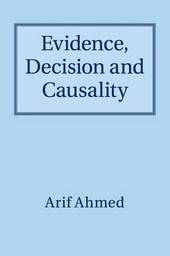
|
Evidence, Decision and Causality
Paperback / softback
Main Details
| Title |
Evidence, Decision and Causality
|
| Authors and Contributors |
By (author) Arif Ahmed
|
| Physical Properties |
| Format:Paperback / softback | | Pages:262 | | Dimensions(mm): Height 227,Width 151 |
|
| Category/Genre | Philosophy - epistemology and theory of knowledge
Probability and statistics
Philosophy of science |
|---|
| ISBN/Barcode |
9781316641545
|
| Classifications | Dewey:519.542 |
|---|
| Audience | | Professional & Vocational | |
|---|
| Illustrations |
Worked examples or Exercises; 36 Tables, black and white; 2 Line drawings, black and white
|
|
Publishing Details |
| Publisher |
Cambridge University Press
|
| Imprint |
Cambridge University Press
|
| Publication Date |
2 February 2017 |
| Publication Country |
United Kingdom
|
Description
Most philosophers agree that causal knowledge is essential to decision-making: agents should choose from the available options those that probably cause the outcomes that they want. This book argues against this theory and in favour of evidential or Bayesian decision theory, which emphasises the symptomatic value of options over their causal role. It examines a variety of settings, including economic theory, quantum mechanics and philosophical thought-experiments, where causal knowledge seems to make a practical difference. The arguments make novel use of machinery from other areas of philosophical inquiry, including first-person epistemology and the free will debate. The book also illustrates the applicability of decision theory itself to questions about the direction of time and the special epistemic status of agents.
Author Biography
Arif Ahmed is Senior Lecturer in Philosophy at the University of Cambridge.
Reviews'... Ahmed's book on the debate between EDT and CDT is a very welcome addition to the literature in decision theory. It is a very subtle and finely crafted review of the principal points pertinent to an adjudication of the debate. Both sides of the debate have much to learn from Ahmed's precise formulation and thorough assessment of these points. He casts old arguments in new light and constructs new arguments with great ingenuity to produce a spirited defense of EDT. I heartily recommend this book to all decision theorists.' Paul Weirich, Notre Dame Philosophical Reviews
|